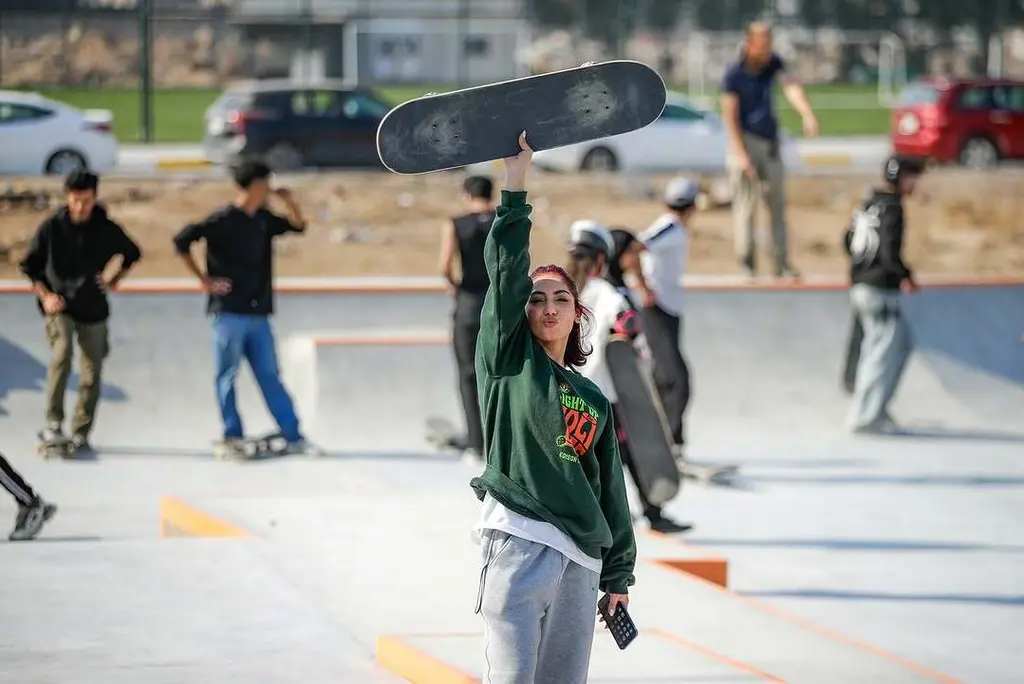What is the link between mental and physical health?
- Text by Huck
- Photography by Robbie May

Zoë Aston is the author behind Your Mental Health Workout, a five-week programme that helps the reader come away with what she terms a “healthier, happier” mind.
For the writer, therapist and mental health consultant, it’s about getting people to think about looking after their brain the same way they would their body. Zoë, a former dancer who’d benefitted from therapy herself, believes that viewing them as one is key when it comes to a healthier, more holistic experience.
“I wanted to create something that was just accessible to everyone, whether you considered yourself to have an issue or not,” she says. “That’s where the idea of the mental health workout came in – the connection between body and mind. The idea that you can work on your minds just as you work on your bodies.”
In the second drop from Collectivity, a series created with Reebok that sees Huck connect organisations with like-minded supporters, Zoë united with the Liverpool-based running crew 2Step Collective, in order to discuss mental and physical wellness.
Below, she outlines her advice for 2Step – whether it’s the importance of embracing regular mental workouts, or sticking with the ones that don’t immediately click.
 Treat mind and body as one
Treat mind and body as one
“Your mind is part of your body, they’re the same thing. Habitually, we’ve separated mind and body – we can see our bodies, we can’t see our minds, and we tend to be scared of things that we can’t see. There’s this idea that a healthy mind, healthy body are two different things. But health is health. You can’t have one without the other. You could be the fittest person in the world, but if your mind is out of shape you’re not going to be able to see that. They have to work in line with each other.”
Embrace mental workouts
“I am always saying it would be great if we could have leg day, arm day, chest and back day – and brain day. There is a difference between mental and physical health in the sense that you could do your exercise for an hour, whatever it is, then you can chill for the rest of the day and your metabolism will do whatever it needs to do. But with mental health, you have to be working on it all the time. My aim is to provide people with the steps, skills and resources to know how to do that.
“If you’re training, you’ve probably got a focus – posture, eating right – that means you’re doing something all the time that goes towards physical health. But we’re not taught how to consistently work on our self esteem, how to have good boundaries, how to balance self-care. If we taught people how to do this in the same way we teach other things – like eating right – we’d probably be living in a very different world.”

 Be patient with yourself
Be patient with yourself
“This past year and a half, we’ve seen things changing. Whenever things change, we lose something. When we moved from normal life into lockdown, there was a lot of grief – because there was a lot of change. People found their routines in lockdown. They found things like exercise, running. Now things are changing again, things are busier, it’s an impossible expectation that you’re going to be able to keep up your lockdown routines. The trick is to not give yourself a hard time about it. Just because you’re not running six times a week, it doesn’t mean that seeing your friends isn’t contributing to another aspect of your health. Change is okay, it doesn’t have to be the same all the time.”
Think long-term
“The biggest mistake people make around mental health is that they do something once. or twice, then they stop doing it, and they’re like, ‘That didn’t work for me.’ If you ran for three days and all of a sudden you weren’t an ultra-marathon runner, you’d probably be like, ‘I need to train more.’ For some reason, with mental health, we give up quite quickly, we don’t allow [different practices] an opportunity to show us what they can do for us. Commit to a period of time that is longer than four weeks and see what works for you. Sometimes the things you don’t want to do – the most painful mental health workouts – are the ones that make the most difference. Just like physical ones.”
 Collectivity is an editorial series produced in collaboration with Reebok. View more stories from the partnership.
Collectivity is an editorial series produced in collaboration with Reebok. View more stories from the partnership.
Enjoyed this article? Like Huck on Facebook or follow us on Twitter.
You might like

Maryam El Gardoum is breaking new shores for Morocco’s indigenous surfers
The Amazigh Atlantic — Through her groundbreaking career and popular surf school, the five-time Moroccan champion is helping women find their places in the waves.
Written by: Sam Haddad

Volcom teams up with Bob Mollema for the latest in its Featured Artist Series
True to This — The boardsports lifestyle brand will host an art show in Biarritz to celebrate the Dutch illustrators’ second capsule collection.
Written by: Huck

Bohemian FC is more than a football club
Carefree, wherever you may be — With rock star friends, a fierce commitment to Palestinian solidarity and their very own climate justice officer, north Dublin’s fan-owned team make their presence felt far beyond the pitch.
Written by: Tiernan Cannon

Gazan amputees secure Para-Cycling World Championships qualification
Gaza Sunbirds — Alaa al-Dali and Mohamed Asfour earned Palestine’s first-ever top-20 finish at the Para-Cycling World Cup in Belgium over the weekend.
Written by: Isaac Muk

In Baghdad, skater girls are reshaping Iraqi womanhood
Baghdad is rad — As the city’s first skatepark opens, the new space is providing a blank canvas for its board culture. Dalia Dawood speaks to the people looking to make its ramps and rails a safe haven for women and girls.
Written by: Dalia Dawood

Frazer Clarke: “I had a hole in my leg, I’m very lucky to be alive”
Hard Feelings — For our interview column on masculinity and fatherhood, the Olympic boxing medallist speaks to Robert Kazandjian about hard graft, the fear and triumph of his first fight, and returning to the ring after being stabbed on a night out.
Written by: Robert Kazandjian

